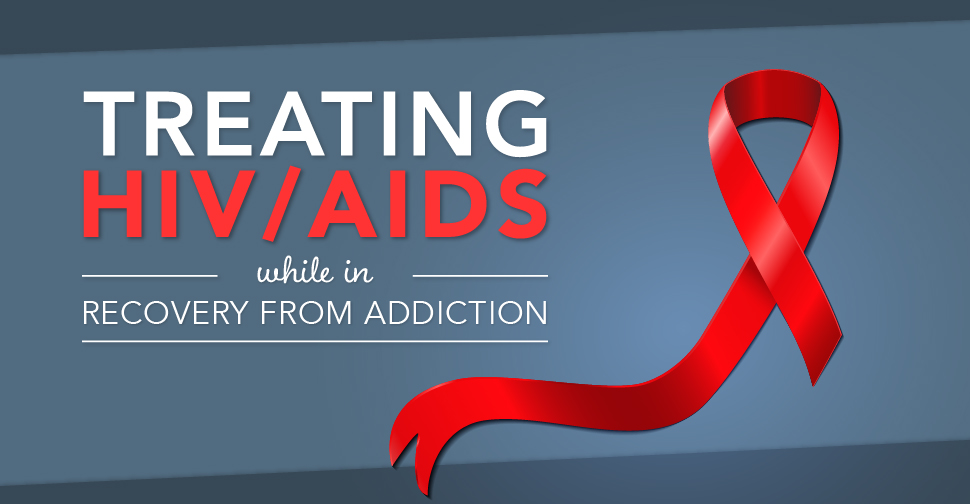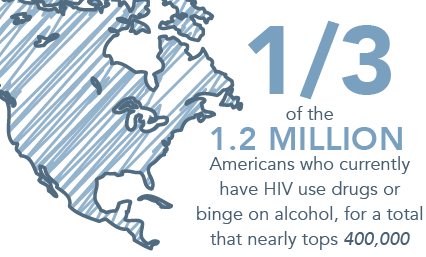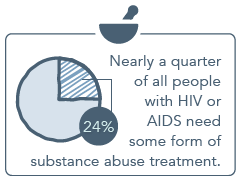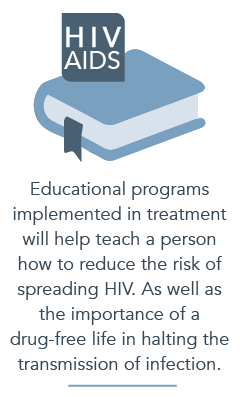
When a person suffers from HIV or AIDS and an addiction at the same time, they are caught in the grip of two very serious and dangerous health problems. Although both are life-threatening on their own, when paired together they are even more dangerous. Thankfully, it is possible to treat these problems and become a healthier and happier person in the process.
HIV And Drug Use Is Often Intertwined
According to the National Institute on Drug Abuse: “Drug abuse and addiction have been inextricably linked with HIV/AIDS since the beginning of the epidemic. The link has to do with heightened risk—both of contracting and transmitting HIV and of worsening its consequences.” They claim that one-third of the 1.2 million Americans who currently have HIV use drugs or binge on alcohol, for a total that nearly tops 400,000.

They also reported that 16 percent of all HIV transmission cases were due to intravenous drug use. Another telling statistic stated that nearly a quarter of all people with HIV or AIDS (24 percent) need some form of substance abuse treatment.
These surprising and troubling statistics make it clear why these two co-occurring disorders have been declared intertwined epidemics. But why does drug use seem to so heavily influence the spread of HIV and what problems can this cause when attending addiction treatment?
Why Drug Use Increases HIV Risk
Before moving on to treatment, it is important to understand how HIV and drug use are connected and how drug use can increase the risk of HIV. These risks, as outlined by the AIDS.gov, include:
- Sharing needles when using heroin or other injection drugs increases the risk of transmission
- Alcohol and drugs affect your immune system and make the spread of HIV more likely and the development of AIDS quicker
- Dangerous and problematic behaviors caused by addiction may lead to inappropriate sexual behaviors, which leads to an increased risk of spreading
- HIV
- Needing a blood transfusion after an addiction-related incident: though the risk is very low, as blood is screened, there’s still a small chance that HIV may be transmitted through transfusion
- Reusing drug paraphernalia (such as bottle caps, spoons, water, and syringes) that may be infected with HIV
These risks make HIV and AIDS testing for those who are addicted to drugs or alcohol highly recommended, especially if they engage in risky sexual behaviors. However, there are several subsets of the population in which HIV and drug use is a more common occurance.
Those At A Higher Risk For This Co-Occurring Disorder
The Centers for Disease Control and Prevention has not only noted certain people who were at risk for HIV and AIDS, but noted how drug use influenced the spread of this disease. They also noticed that certain portions of the population were more at risk for falling victim to these co-occurring disorders. These vulnerable areas of the population include:
- Those who suffer from poverty or other financial problems
- Homosexual men who engage in excessive alcohol and drug use and promiscuous sex
- Those who had a history of abuse, including sexual, physical, or emotional, especially abuse inflicted by a loved one
- Segments of the population who suffer from mental health illnesses, such as depression, poor impulse control, and “risk taking” personality traits
- Users who prefer injection drugs, such as heroin, methamphetamine, and even some forms of pain killers
While these populations are not the only ones who suffer from the co-occurrence of drug addiction and HIV, they seem to be at the highest risk. Thankfully, both are now considered widely treatable even when paired together, though not without challenges.
The Difficulties Of Treating HIV And Drug Addiction
 Treating HIV or AIDS and drug addiction at the same time is often complicated by a variety of concerns. Beyond the health problems that both cause (such as low energy, malnutrition, and susceptibility to outside diseases), lies the fact that many HIV/AIDS medications may actually cause multiple side effects that makes drug addiction more difficult to physically handle.
Treating HIV or AIDS and drug addiction at the same time is often complicated by a variety of concerns. Beyond the health problems that both cause (such as low energy, malnutrition, and susceptibility to outside diseases), lies the fact that many HIV/AIDS medications may actually cause multiple side effects that makes drug addiction more difficult to physically handle.
For example, many antiretroviral therapies (ARTs) that are used in the treatment of HIV and AIDS can cause a variety of side effects, including troubles with metabolism, bone loss, strange fat distribution, and allergic reactions which may put the life of the treated person at risk. Thankfully, there are multiple medications on the market to treat both HIV and AIDS, so it should be possible to find one that works for a person’s specific needs and health concerns.
Other problems with HIV/AIDS medications include the impact they can have on various parts of your body. Some of them are prone to hepatotoxicity, or causing damage to the liver. Those who are addicted to alcohol will have likely already suffered from severe liver damage, and the influence of these medicines may only make those symptoms worse. Thankfully, these liver problems sometimes go away once the medicine is stopped.
HIV/AIDS medicines with a risk of hepatotoxicity include most nucleoside reverse transcriptase inhibitors (NRTIs) and some non-nucleoside reverse transcriptase inhibitors (NNRTIs), specifically nevirapine, otherwise known as Viramune. Talking to a doctor about these medications before treatment begins, is a crucial way of ensuring that serious and potentially irreversible liver damage does not occur.
Some HIV treatment medications can cause a wide range of side effects, such as nausea, vomiting, diarrhea, weakness, tiredness, increased thirst, headache, rashes, fevers, high blood sugar, increased risk of diabetes, shortness of breath, increased lactate in the body, nerve problems, high blood pressure, high cholesterol, problems with kidneys, and a host of others.
It is also important to note that these medicines have side effects that may vary between genders. Experts theorize that this is due to the differences in hormonal makeup, body size, and body fat content. For example, women often experience greater amounts of nausea and vomiting, but lower instances of diarrhea than men who are taking the same medicine. Some studies exhibit that women are also more prone to suffer from rashes and complications of the liver and pancreas.
All of these side effects may seem disheartening, especially when a person has to go through the rigors of detoxification and drug addiction treatment. However, treating addiction and HIV/AIDS simultaneously is possible and very beneficial, both for your ongoing heath and sobriety.
Treatment Of Drug Addiction And HIV
Treating HIV/AIDS and drug addiction at the same time requires a concentrated and many-branched approach that takes into account the difficulties of both problems and works to manage both. First of all, a treatment for HIV/AIDS will be outlined and implemented to help get a person acheive better health. This is important, as drug addiction treatment requires as a strong body and mind to succeed.
One of the first steps is to assess the person’s health and to take steps to improve it. For example, someone suffering from serious malnutrition may struggle with a severely impacted immune system. Those with severe physical pain caused by HIV/AIDS and addiction may receive soothing massages and other forms of physical therapy. Additionally, those with scars or bruising caused by HIV/AIDS may receive appropriate treatment to manage those problems.
After these treatments have been administred, HIV/AIDS treatment medicines will be carefully chosen to ensure that they don’t interfere with the person’s health or the withdrawal process. Once the person is deemed to be best prepared for it, withdrawal treatment will begin. This includes a regime of replacement medicines that help stave off the more severe withdrawal symptoms. Experts will carefully monitor the health of their client to make sure that they aren’t going to suffer from a severe and negative interaction between these medicines.
Once withdrawal treatment is over, mental health treatment can begin. This is often more complex than traditional treatment methods, due to the influence of HIV and AIDS. A person may feel a sense of foreboding and fear about their disease that may influence and worsen the symptoms of depression and anxiety. As a result, their medical health professionals need to take special care to manage these concerns, as well as any other underlying problems that may also influence the addiction.
While these treatments are going on, educational programs will also be implemented. These help teach a person how to reduce the risk of spreading HIV and the importance of a drug-free life in halting the transmission of infection. Safe sex techniques may be discussed and heavily emphasized to help prepare them  for facing current or future relationships and to decrease their chance of transmitting HIV.
for facing current or future relationships and to decrease their chance of transmitting HIV.
Oftentimes, behavioral adjustment techniques will be undertaken alongside these treatment methods. These methods help to correct the negative behaviors that influence drug addiction (such as relapse triggers, negative thought patterns, and repetitive behaviors that may feed addiction), and also help correct ways of thinking or acting that may influence the spread of HIV. In every step of this process, it is important to emphasize and educate on both sobriety and on how to avoid the tranmision of HIV.
Regaining The Health You Deserve
 As you can see, it is possible to beat addiction and successfully treat HIV by a concentrated and serious treatment in drug addiction therapy. If you or someone you love is suffering from this problem, you need to do what you can to ensure that help is available. Please contact us at DrugRehab.org today to learn more about how to beat addiction and treat HIV/AIDS.
As you can see, it is possible to beat addiction and successfully treat HIV by a concentrated and serious treatment in drug addiction therapy. If you or someone you love is suffering from this problem, you need to do what you can to ensure that help is available. Please contact us at DrugRehab.org today to learn more about how to beat addiction and treat HIV/AIDS.
Sources
National Institute On Drug Abuse – DrugFacts: HIV/AIDS And Drug Abuse: Intertwined Epidemics
National Institute On Drug Abuse – Drug and Alcohol Use – A Significant Risk Factor for HIV
AIDS.gov – Substance Abuse/Use
National Heart, Lung, And Blood Institute – What Are The Risks Of A Blood Transfusion?
Centers For Disease Control And Prevention – HIV And Substance Abuse In The United States
National Institute Of Allergy And Infectious Diseases – HIV/AIDS Drugs Complications and Side Effects
National Institute Of Health – Side Effects of HIV Medicines: HIV and Hepatotoxicity
Office On Women’s Health – HIV/AIDS Drugs And Side Effects
Substance Abuse Treatment For Persons With HIV/AIDS – Chapter 7 — Counseling Clients With HIV And Substance Abuse Disorders

